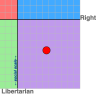Why do most people refuse to accept that they are wrong
I have come across a lot’s of people like these. like 99% of them. Sometimes it makes me think twice if what i am saying is wrong? What’s wrong with them. Is it so hard to swallow your pride and acknowledge that the other person is speaking facts? When they come to know they are wrong they proceed to insult/make fun of others to save their ass. Just why?










Add comment